Here's a tribute compilation to some famous people who swooped the planet in 2006.
Some people aren't here due to the space limits in keeping the download time manageable. Or, because no song by them was handy. Besides, using "Do the Freddie" for Freddie Laker, "Casper the Friendly Ghost" for Caspar Weinberger or "It All Depends on You" for June Allyson, would hardly do 'em justice.
A few choices are admittedly esoteric. I associate Glenn Ford with "Experiment in Terror" although the line "Who called the English teacher Daddy-o" from The Coasters' "Charlie Brown" might've been better for any "Blackboard Jungle" fans. Or I could've left him out entirely and included some singer I didn't care about but would be expected to include. Here's how it ended up:
1. "In Another World" by Ruth Brown, died November 17, age 78
2. "Whisper Not" by Anita O'Day, died November 23, age 87
3. "The Men in My Little Girl's Life" by Mike Douglas, died August 11, age 81
4. "Arnold Layne" by Pink Floyd with Syd Barrett who died July 7, age 60.
5. "Wasted Days..." by Freddy Fender, died October 14, age 69.
6. "Act Naturally" by Buck Owens, died March 25, age 76.
7. "Kiss of Fire" by Georgia Gibbs, died December 9, age 87
8. "I Feel Good" by James Brown, died December 25, age 73
9. "Gonna Fly Now" by Maynard Ferguson, died August 23, age 78
10. "Theme From Mike Hammer" for Mickey Spillane, died July 17, age 88 and
Darren McGavin, died February 25, age 83.
11. "You'll Never Find Another Love..." by Lou Rawls, died January 6, age 72
12. "Nothing from Nothing" by Billy Preston, died June 6, age 59
13. "Meanest Guy That Ever Lived" written and sung by Jack Palance, died November 10, age 87
14. "Andy Griffith Show" for Don Knotts, died February 24, age 81.
15. "Munsters" theme for Al Lewis, died February 3, age 82
16. "Experiment in Terror" by Al Caiola for Glenn Ford, died August 30, age 90.
17. "Burke's Law" by Al Caiola for Aaron Spelling, died June 23, age 83
18. "Miserable" by Anna Russell, died October 18, age 94
19. "Barney Miller" for Jack DeLeon (aka "Marty" the gay klepto), died October 16, age 81.
20. "Topper" theme for Robert Sterling, died May 30, age 88.
21. "MASH theme" by The MASH for Robert Altman, died November 20, age 81.
22. "Jeffersons" theme for Mike Evans, died December 14, at 57.
23. "Puttin' On the Ritz" shouted by Peter Boyle, died December 12, age 71
24. "Town Without Pity" by Gene Pitney, died April 5, age 66.
25. "Israelites" by Desmond Dekker, died May 25, age 64
26. "My Boomerang Won't Come Back" (unaltered take) by Charlie Drake, died Dec. 24, age 81
27. "Stagger Lee" by Wilson Pickett, died January 19, age 64.
28: "Dream Baby" by The Big O, for songwriter Cindy Walker, died March 23, age 87
Bonus track: "People Who Died" by Jim Carroll is dedicated to two execs at Atlantic Records (the label that released Jim's song) Ahmet Ertegun and Arif Mardin, and to anyone famous or not who you lost this year.
An illfolks salute to Dana Reeve, Jan Murray, Muriel Spark, Floyd Patterson, Barnard Hughes, Moira Shearer, Shelley Winters, Dennis Weaver, Jack Warden, Red Buttons, Lennie Weinrib and the comic/character actor Richard Stahl.
This post dedicated to "that most sporty of spirits," Robert Sterling.
DEAD? Didn't Even Know They Were Ill...via R-Share
UPDATE: This one died from lack of interest. Can't find the back-up on this one, so it'll be a long time before it turns up again.
The Blog of Less Renown, celebrating under-appreciated unusual, unique, sick or strange Singers, Songwriters and Songs
Friday, December 29, 2006
THE SEASONS FOLK IT UP
 When that greasy doo wop stuff began to give way to protest music, Frankie and his pals made a brief pit-stop into folk-rock. They became a supersized Kingston Trio, with energetic banjos and thumpitty-drums.
When that greasy doo wop stuff began to give way to protest music, Frankie and his pals made a brief pit-stop into folk-rock. They became a supersized Kingston Trio, with energetic banjos and thumpitty-drums. Comfy pop accounted for the hit single "Silence is Golden" but mainly it's "Where Have all the Flowers Gone," "A Ballad of Our Time," "Searching Wind," etc. The real find: "New Town" written (but not recorded) by Phil Ochs. That song, and the failure of the foursome to succeed in the folk medium, puts this superstar group on the obscure pages of the illfolks blog.
FRESH LINK: Take off the tux. Strap on a Guitar
UPDATE: This file expired from lack of interest. (OK, this was before JERSEY BOYS turned upon Broadway, but don't expect a re-up any time soon.)
LET IT BE...in Chinese dialect - PAUL FREES
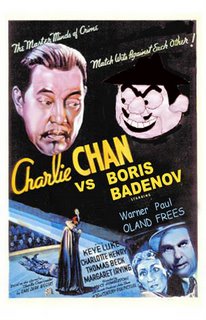
This blog's last but not least single for 2006 is appropriately, LET IT BE.
But in its most inappropriate form.
Paul Frees probably was used to racial stereotyping from having worked with Spike Jones, who regularly had his singers do black dialect ("You Always Hurt the One You Love"), Asian schtick ("Chinese Mule Train"), and questionable Semitism ("Tennessee Waltz."). Paul wasn't usually asked by Spike Jones to be racist but...Pillsbury made an offer.
In the 60's they sold non-nutritional powdered drink mixes. "Freckle Face" strawberry and "Chinese" cherry were among their "Funny Face" products. Paul voiced most of the characters.
And so, with Spike and Pillsbury for influences, it's no surprise that a few years later Paul saw nothing wrong with turning "Let It Be" into an R-infected Asian parody. (And he wouldn't be the last...Peter Sellers as "Sidney Wang" in "Murder by Death" for example).
My only real objection to what was considered goofy fun more than anything racist, is that all the other cuts on "Paul Frees and the Poster People" were accurate caricatures of famous stars (Karloff, Lugosi, Lorre, etc.) but he sounds nothing like the sweet, soft-spoken Warner Oland (as advertised) or even the stern and haltingly articulate Sidney Toler. Paul's "Charlie Chan" is just an excuse for clazed phlazing. Uh crazed phrasing.
But it's SO over the top it'll probably raise more smiles than middle fingers.
My appreciation of Paul's work verges on awe (he voiced Boris Badenov, Ludwig Von Drake, the Pillsbury Doughboy, etc.)...but I won't be surprised if a few of you listen to this and say "Aw...."
PAUL FREES
RET IT BE Instant download or listen on line. No Zinfart passwords, malware or spyware anywhere.
Tuesday, December 19, 2006
BOBBY COLE "Growing Old"
On this day, December 19th, in 1996 my friend Bobby Cole died.
"Growing Old" is the last song on his solo album, 'A Point of View.'
GROWING OLD
"Growing Old" is the last song on his solo album, 'A Point of View.'
GROWING OLD
SACRILEGE #2: BOB DYLAN LAMPOON
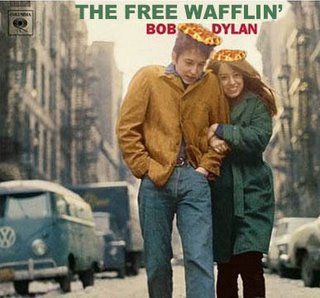
"The waffle farmers got a chance to lob their pickle grenades..."
Gee! How waffle!
How does it feel, to no longer be a complete unknown...and the target of some jerks makin' fun of your hallucinogenic lyrics?
Watch out for the Yogurt People. Ketchup in your hair. Because..."17 Miles from Waukegan My Cantelope Died." That's the title of this very early Dylan parody. It's on the Harvard Lampoon's "Sheep" album (many years before the National Lampoon and their "Lemmings").
Sacrilege #2 in the continuing series. They're parodying Dylan!
What's it to ya, Moby Dick?
POTRZEBIE
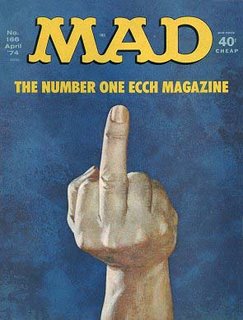
Someone at the YOUDONTHAVETOVISIT blog was asking to hear "Potrzebie." There's no accounting for taste, is there? Now what idiot would have a copy of...oh. Me.
Caveat dissapointor: if you were expecting something like Soupy Sales' "Pachalafaka" or a snappy Spike Jones or Raymond Scott number, sorry, but this instrumental doesn't live up to having a Mad Magazine catch-word for a title.
Sapristi!
No, POTRZEBIE. Credit to Alfred E. Neuman and his Fershlugginer Five.
A Mad instru-mental.
Sylvia Froos & Allan Sherman
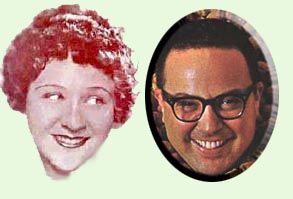
Allan Sherman you know about.
So let's talk Froos.
Sylvia was a child star in vaudeville. While Al Jolson made the first feature-length "talkie, "Baby Sylvia" starred in two short sound films released six months earlier. "The Little Princess of Song," was a star through the 30's, and in Shirley Temple's "Stand Up and Cheer".
She even had her own radio show. "Who's Your Little Who-Zis?" was a novelty hit for her and she recorded many popular singles.
Here's one of her last recordings. It's a duet with Allan Sherman on a parody of Frank Loesser's "A Bushel and a Peck." At the time, 1951, Allan was unknown. It would be a decade before he had a surprise hit via the "My Son the Folksinger" album.
This single was simultaneously a farewell to the winsomely lilting vocals of Froos and a hello to a new voice in kosher comedy. Allan died in November of 1973. Sylvia enjoyed a long, happy retirement and died in March of 2004.
If one of your eight days of Chanukah gifts isn't so hot, maybe this will make up for it?
A SATCHEL AND A SECK
Winter Wonderland - ZEVON & TRANNIES

Two of the more unusual versions of "Walkin' in a Winter Wonderland" are here for your download. Or, in the case of the parody "Walkin' Round in Women's Underwear," your downlow.
Warren Zevon will continue to amuse and amaze because his volume of work has such depth. His personality resonates too; you can listen to this and enjoy it as either nostalgic or sardonic.
If you're a guy who likes wearing women's undies don't feel bad. It beats the idiots who insist on wearing Santa hats out in public. But if you're wearing a Santa hat AND women's underwear underneath your suit, that's a little too ill even for ILLFOLKS!
Tom Lehrer says that most novelty songs get predictable after a verse or two, and this one peters out, but if "peters out" and "women's underwear" sound good to you then go....
WALKIN' ROUND IN... WOMEN'S UNDERWEAR
WARREN ZEVON'S WINTER WONDERLAND
Saturday, December 09, 2006
MR. BOJANGLES : TEN VERSIONS
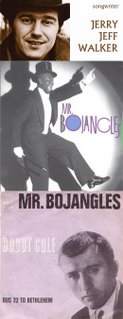
Nearly 40 years ago, Jerry Jeff Walker began strumming up a tune inspired by Bill "Bojangles" Robinson, the dancer/vaudevillian. A folkie at the time with country leanings, he played the song pretty straight. In the audience one night was Bobby Cole, a singer now better known as the arranger/conductor for Judy Garland.
Lightning struck. Bobby probably had the same glow George Martin got on hearing a demo of "Being for the Benefit of Mr. Kite." What possibilities! With production ideas brimming in his mind, Bobby called in all favors, got recording studio time, and after a brief release on his own Concentric label, finally got Columbia/Date to put out the single. At the same time, Walker recorded his folk-strumming version.
Bobby transformed the simple, unadorned folk ballad by adding the flavor of vaudeville and traveling shows; he used a calliope effect for the introduction, and updating lounge for the psych 60's found a woman who could play a weird brand of electric violin that wistfully tinged the tune into sunset colors. Ultimately, he added his unique vocal. The song sounds like it's from someone as weary and worn as Mr. Bojangles himself.
When Bobby's song hit the airwaves, try to imagine how stunned Top 40 audiences were; the strange arrangement, the unusual violin in there, and the wistfully haggard vocal so different from anyone else. In its way, the single was as daring as "Sgt. Pepper."
As the song climbed the charts, ATCO offered competition via Jerry's version, a simple, honest strum. Where Columbia had influence, Bobby's was the radio hit. Where Atco reigned, stations favored Jerry's version. Both stalled at the edge of the Top 40 in the summer of 1968.
Together, Cole and Walker blazed a trail followed by dozens and dozens of cover versions. People chose to follow Walker (Dylan, Nitty Gritty Dirt Band, etc.) or they emulated Bobby (Sammy Davis, George Burns, Robbie Williams).
Sadly neither man would have another hit single. At least, Walker fans got a lot more albums and Jerry Jeff is still out there.
How I met my friend Bobby Cole is a kind of "Bojangles" story. Some twenty years after the song came out, I met him in a club, not down and out, but playing the standards. Like the man in the song who asked Bojangles to dance, I asked Bobby if he'd play a song for me; "Bus 22 to Bethlehem," the flip side to "Mr. Bojangles." Bobby was surprised to hear anyone mention that song. "Stick around," Bobby said in that gruff voice, "I wanna talk to you." He and his trio had taken a break between sets and he had to get back.
I'll just say that he turned out to be one of the most unique friends I ever had. I miss him.
"One Hit Wonder" is a cruel term, but here, it applies to a strange little moment in time when lounge and jazz sensibilities (note the backbeat drums and the late arrival of the clarinet toward the end) melded with progressive rock (the influence of "Mr. Kite" seems evident) and as produced, arranged and sung by Bobby Cole, produced a gem.
The nine other versions you get include Jerry Jeff Walker's mono single, the Nitty Gritty gang, John Denver, Sammy Davis Jr., Robbie Williams, Luba Mason, Nina Simone, etc. etc. Via R-Share of course:
MR. BOJANGLES DANCE
Bus 22 to Bethlehem
Bobby Cole put so much time and energy into creating "Mister Bojangles...." he pretty much forgot about the B-side!
He quickly got a few session players to back him on "Bus 22 to Bethlehem," a Dylanesque folk-rock experiment in symbolism.
One of Bobby's massive problems involving any kind of consistent success, was his restless versatility. He enjoyed all types of music, but booking agents and record companies like to categorize their talent. Bobby wasn't jazz, folk or pop. Even though his latter years were spent on the nightclub circuit, Bobby's repertoire ranged from "A-Train" through "The Big Hurt," Leonard Cohen and Procol Harum.
Bobby's lyrics often strayed into the intellectual, while his audience was literally lush. Bobby's pals like Sinatra and Garland (oh, the stories Bobby told) knew enough not to challenge their crowds with anything too complicated. Bobby tended to challenge everyone, and he was complex enough to laugh with the sinners Saturday night, and go to church with the saints Sunday morning. Hence, this song does spring from sincerity.
As you listen to this lost '68 folk-rock number you might find some lounge-jazz qualities in Bobby at odds with the folk strumming, but the song is a meditation on conflict: "the Christians, and the Muslims exchanged frozen looks." Times have changed. Now they exchange mortar fire.
NOW BOARDING: Your download for BUS 22 to BETHLEHEM
He quickly got a few session players to back him on "Bus 22 to Bethlehem," a Dylanesque folk-rock experiment in symbolism.
One of Bobby's massive problems involving any kind of consistent success, was his restless versatility. He enjoyed all types of music, but booking agents and record companies like to categorize their talent. Bobby wasn't jazz, folk or pop. Even though his latter years were spent on the nightclub circuit, Bobby's repertoire ranged from "A-Train" through "The Big Hurt," Leonard Cohen and Procol Harum.
Bobby's lyrics often strayed into the intellectual, while his audience was literally lush. Bobby's pals like Sinatra and Garland (oh, the stories Bobby told) knew enough not to challenge their crowds with anything too complicated. Bobby tended to challenge everyone, and he was complex enough to laugh with the sinners Saturday night, and go to church with the saints Sunday morning. Hence, this song does spring from sincerity.
As you listen to this lost '68 folk-rock number you might find some lounge-jazz qualities in Bobby at odds with the folk strumming, but the song is a meditation on conflict: "the Christians, and the Muslims exchanged frozen looks." Times have changed. Now they exchange mortar fire.
NOW BOARDING: Your download for BUS 22 to BETHLEHEM
Seasonal Songs by Raun & Koloc

Since you'll be sick of Xmas songs soon, I'm getting this pair of ill folkies in before "Jesus Christ" is uttered in disgust at holiday music overload.
Not that this is typical annoying Christmas music. Not here!
Raun MacKinnon's song is about a nun, and Bonnie Koloc's "25th of December" is more a meditation on holiday depression.
Folkies Raun and Bonnie have one thing in common, they both sang backing vocals on Steve Goodman's "Jessie's Jig" album.
Raun, raised in Philadelphia, was signed to Cameo-Parkway, known for greasy male teen vocalists and soul. On that obscure lp her bassist was Spike Lee's father Bill. Her next (and last) stop was for Kapp, where she tried to add more rock and pop (ooh, trumpets lending a religious tone to "Sister Marie"). She taught guitar, and still performs on bills with Christine Lavin.
Koloc? You might remember her sweet taffy voice extolling "Mother Country" in a series of United Airlines commercials. Sort of the vanilla Billie Holiday, Bonnie's voice has a sorrowful and vulnerable quality. Gaining attention in the 60's at Chicago's Earl of Old Town, she's amassed ten albums, briefly appearing on a major label (Epic) before returning to the ranks of individualistic singer-songwriter self-pressing CDs.
"25th of December" (from the OP 1984 "You're Gonna Love Yourself in the Morning" album which also has the infamous "Mother Country") is a good example of the slight funk most people feel when the Christmas punch bowl seems half empty rather than half full. Since her voice really is quite pretty, the needle stays in the groove for the next song on the album, "Lion Tamer." It's about some guy who can handle lions, or pussy. Bonnie is so nice, I'll bet she didn't consider the euphemism in the lyric, and considering it's nearly Christmas, I'm almost ashamed to mention it.
Instant downloads, no Rapidshare or Pop-Up Porn-Ad Referring Links...
Bonnie Koloc
Raun MacKinnon
